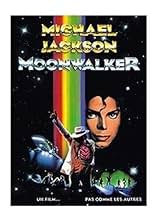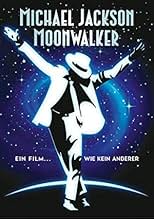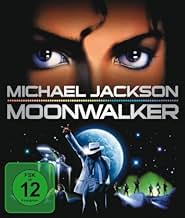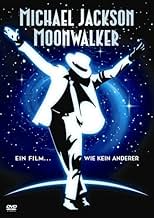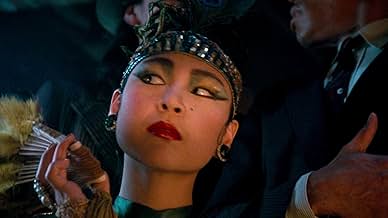Anthology movie by, and starring, Michael Jackson in his prime, combining a number of music videos from his bestselling "Bad" album with a fantasy tale of Michael's confrontation with a ruth... Read allAnthology movie by, and starring, Michael Jackson in his prime, combining a number of music videos from his bestselling "Bad" album with a fantasy tale of Michael's confrontation with a ruthless drug dealer known as Mr. Big.Anthology movie by, and starring, Michael Jackson in his prime, combining a number of music videos from his bestselling "Bad" album with a fantasy tale of Michael's confrontation with a ruthless drug dealer known as Mr. Big.
- Awards
- 2 wins & 2 nominations total
Kelley Parker
- Katie
- (as Kellie Parker)
Brandon Quintin Adams
- Zeke
- (as Brandon Adams)
Jeff Adkins
- Dancer (segment "Smooth Criminal")
- (as Jeffry Adkins)
- Directors
- Writers
- All cast & crew
- Production, box office & more at IMDbPro
Storyline
Did you know
- TriviaMichael Jackson originally wanted the movie released in theaters in the United States, but budget problems forced him to make it a straight to video release. However, it was released in theaters internationally.
- GoofsWhile Michael is performing "Come Together" his white shirt is ripped to his chest, then to his pants, then not ripped at all, then ripped to his pants, and so on throughout the whole performance.
- Alternate versionsMTV and VH1 have shown this film many times, and although it isn't a long film they have cut it, specifically the "Smooth Criminal" segment (the showpiece of the film): The dance segment in Club 30's is heavily edited, as is the scene where the kids' dog is returned to them by Michael's manager (leaving one plot question unanswered!) The "Come Together" performance is also shorter. The more recent VH1 Rock and Roll Picture Show airings cut the film down even more, most noticably in the Retrospective sequence.
- ConnectionsEdited from Michael Jackson: Speed Demon (1988)
Featured review
In 1988, Michael Jackson was literally on top of the world. His 1987 album Bad had set a record for the most number one singles to come from the same album. Add to that the fact that his previous albums had all set records for sales, to the extent that not even an organisation as powerful as the RIAA could withhold his rightful share of the money. To cut a long story short, Jackson was the King of the musical world, and even to an old cynic like myself who was raised on Black Sabbath, it did not seem undeserving. So when Michael Jackson asked for more than twenty million dollars to make a series of fantasy viginettes based around his songs that basically portray him as the saviour of the world, the last thing the combined powers of the MPAA and RIAA were willing to say was "no". But then the 1990s hit, and Michael Jackson's reputation in the world's consciousness changed from that of an eccentric billionaire to a worn out circus freak. Let that be a lesson to all budding musicians - if it can happen to Michael Jackson, it can literally happen to anybody.
It appears that Warner Brothers now own the rights to this rather odd piece, so it has finally seen the light of day on DVD-Video. This time capsule of the late 1980s is as odd now as most of the rest of the Michael Jackson material that came after. As you can expect from a film that mostly consists of viginettes put together to the specifications of an eccentric millionaire, unifying themes are hard to come by. The first thirty-five or so minutes of the film is a quick recap of Jackson's career up to that point, followed by what is essentially an extended pair of music videos that satirise the cannibalistic fascination the press had with Jackson in the 1980s. It is after this thirty-five minutes that the material finds a real focus, and in spite of the high bar set by the earlier material, it manages to get even stranger than before.
The plot of Moonwalker proper concerns itself with a non-specific future world where we follow three children living in a dirty world of squalor. As a hit squad makes an attempt on the life of Jackson, who is playing himself, we get a flashback to happier times that ends in a weird explanation of why the world we see is now so dirty. Joe Pesci portrays an embodiment of evil by the name of Frankie Lideo, whose ambition is to have every child in the world taking drugs. Given that Ritalin and such torture pills were still popular at the time, Jackson's vanity project takes on a scary level of accuracy I doubt he intended. Of course, the whole thing is just a transparent Just Say No message that gained Jackson a few points with the Reagan administration at the time, and doubtlessly got the nod from Bush senior, too. Not least because of Joe Pesci's immortally embarrassing line about how his troops have to stop "them" praying in school. I do not know whether Jackson or co-writer David Newman came up with this crock, but it is a good thing Jackson ran out of favours with the Republican party during the 1990s. Otherwise, who knows what kind of propaganda we would have to tolerate today?
To be fair, the new footage of the film is skilfully edited, shot, and choreographed. Being one of the few films shot with a 1.33:1 aspect ratio in mind, it is surprising how dynamic some of the shots are. Joe Pesci chews the scenery like he was previously on a hunger strike, while Paul Reubens gets a cameo as a voice and claymation puppet that will amuse the adults in the audience. The cinematography of the main event is actually quite tight. The special effects more than justify the budget. At the time, the twenty-two million dollars used to make the film was consider extravagant, even by Michael Jackson's standards. The claymation is far from seamless, and some of the effects are dated, but considering the advances in film-making technology since, it does not look too shabby at all. Had Michael Jackson intended to make a coherent musical rather than a loose framework for music videos, there is no telling what might have resulted.
While RIAA-endorsed music has only got worse since Michael Jackson's fall from the limelight, it is somehow considered cool or hip to rag on the man and his music. I do not know the truth of all the allegations made about Jackson. I really think they are best left to those making them, and the man himself. So when I see the film depicting him playing catch in a park with a small group of children, I do not get the sense of alarm bells so many others describe. The video game based on this film is a whole other story, but video games were considerably cruder in those days. The is a reason why Bad yielded no less than six number one singles (from a track list of eleven, no less). Jackson was at his creative apex, both writing songs and conceiving music videos that neither he nor anyone else endorsed by the RIAA have matched since. The next time you hear someone try to tell you that creativity was dead in the 1980s, this, along with some videos from the likes of Devo, will set them straight.
When all is said and done, I gave Moonwalker a five out of ten. It is as self-indulgent as you would expect from a man who could afford to light his cigarettes with hundred dollar bills. Much of it is unnecessary, even crap, but when it falls back upon its strengths, namely the music, it shines. This is the kind of time capsule that the culture of the 1980s really deserves.
It appears that Warner Brothers now own the rights to this rather odd piece, so it has finally seen the light of day on DVD-Video. This time capsule of the late 1980s is as odd now as most of the rest of the Michael Jackson material that came after. As you can expect from a film that mostly consists of viginettes put together to the specifications of an eccentric millionaire, unifying themes are hard to come by. The first thirty-five or so minutes of the film is a quick recap of Jackson's career up to that point, followed by what is essentially an extended pair of music videos that satirise the cannibalistic fascination the press had with Jackson in the 1980s. It is after this thirty-five minutes that the material finds a real focus, and in spite of the high bar set by the earlier material, it manages to get even stranger than before.
The plot of Moonwalker proper concerns itself with a non-specific future world where we follow three children living in a dirty world of squalor. As a hit squad makes an attempt on the life of Jackson, who is playing himself, we get a flashback to happier times that ends in a weird explanation of why the world we see is now so dirty. Joe Pesci portrays an embodiment of evil by the name of Frankie Lideo, whose ambition is to have every child in the world taking drugs. Given that Ritalin and such torture pills were still popular at the time, Jackson's vanity project takes on a scary level of accuracy I doubt he intended. Of course, the whole thing is just a transparent Just Say No message that gained Jackson a few points with the Reagan administration at the time, and doubtlessly got the nod from Bush senior, too. Not least because of Joe Pesci's immortally embarrassing line about how his troops have to stop "them" praying in school. I do not know whether Jackson or co-writer David Newman came up with this crock, but it is a good thing Jackson ran out of favours with the Republican party during the 1990s. Otherwise, who knows what kind of propaganda we would have to tolerate today?
To be fair, the new footage of the film is skilfully edited, shot, and choreographed. Being one of the few films shot with a 1.33:1 aspect ratio in mind, it is surprising how dynamic some of the shots are. Joe Pesci chews the scenery like he was previously on a hunger strike, while Paul Reubens gets a cameo as a voice and claymation puppet that will amuse the adults in the audience. The cinematography of the main event is actually quite tight. The special effects more than justify the budget. At the time, the twenty-two million dollars used to make the film was consider extravagant, even by Michael Jackson's standards. The claymation is far from seamless, and some of the effects are dated, but considering the advances in film-making technology since, it does not look too shabby at all. Had Michael Jackson intended to make a coherent musical rather than a loose framework for music videos, there is no telling what might have resulted.
While RIAA-endorsed music has only got worse since Michael Jackson's fall from the limelight, it is somehow considered cool or hip to rag on the man and his music. I do not know the truth of all the allegations made about Jackson. I really think they are best left to those making them, and the man himself. So when I see the film depicting him playing catch in a park with a small group of children, I do not get the sense of alarm bells so many others describe. The video game based on this film is a whole other story, but video games were considerably cruder in those days. The is a reason why Bad yielded no less than six number one singles (from a track list of eleven, no less). Jackson was at his creative apex, both writing songs and conceiving music videos that neither he nor anyone else endorsed by the RIAA have matched since. The next time you hear someone try to tell you that creativity was dead in the 1980s, this, along with some videos from the likes of Devo, will set them straight.
When all is said and done, I gave Moonwalker a five out of ten. It is as self-indulgent as you would expect from a man who could afford to light his cigarettes with hundred dollar bills. Much of it is unnecessary, even crap, but when it falls back upon its strengths, namely the music, it shines. This is the kind of time capsule that the culture of the 1980s really deserves.
- mentalcritic
- Aug 5, 2005
- Permalink
Details
- Release date
- Country of origin
- Official site
- Language
- Also known as
- Badder
- Filming locations
- Production companies
- See more company credits at IMDbPro
Box office
- Budget
- $22,000,000 (estimated)
Contribute to this page
Suggest an edit or add missing content



